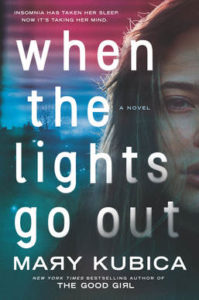I became aware of Mary Kubica’s books a few years ago when The Good Girl was causing a sensation and Pretty Baby was just hitting the shelves. I was so gripped by The Good Girl that I ordered Pretty Baby immediately and raced through that, too. Kubica’s books have a magic and compelling combination of a relatable domestic setting and sharply discomforting suspense. Now, a few years on, I’ve had the pleasure of meeting Mary in person and getting to know her a little. Here, we explore together why we believe domestic suspense novels are so popular nowadays and what has drawn us both to writing them.
Gilly Macmillan: The first thing I’d love to ask you, Mary, is this: did you grow up reading crime novels and thrillers, or are they something you were drawn to later in life? What do you think first sparked your interest in the genre?
Mary Kubica: I’m delighted to have the chance to chat with you, Gilly, and am thrilled that our lives and careers have crossed paths over the last few years. I see many similarities in our work, and am so passionate about the genre we write in. I grew up reading a wide variety of literature as a child. Natalie Babbitt was always a favorite and, though a far cry from crime novels, they are chock full of the tension and mystery that I love in a good book. I didn’t set out to write crime novels or domestic suspense myself. Before my first published novel, I tinkered more in women’s fiction, but felt there was always something lacking in my manuscripts. I’d have what I thought was a terrific start, and then lose interest fifty pages in. When I wrote The Good Girl, I somewhat unintentionally added a few suspense elements and, as I did, was immediately gripped. I knew that I’d found my niche.
As authors of domestic suspense, writing in very intimate settings where our primary characters are often families with children, there can be a tricky balance between making the books both plot and character-driven at the same time, while taking nothing away from the pace of the novel. I’d like to believe that our characters are authentic and deeply human, and that our readers can truly empathize with them. That said, Gilly, your novels are blistering page-turners with intricate plots. Once I start reading one of your books, I can never put it down. How do you go about crafting such well-defined, relatable characters and keep the pages moving and the tension high all at the same time?
GM: I’m interested to hear you grew up reading widely, because I did, too, and still do. I believe it’s crucial to developing as a writer because no matter what genre you are working in, you can always learn something from other authors.
I agree that stories which are both brilliantly plotted and character-driven make for some of the best reads in the domestic suspense genre. There are many awesome examples of this, but I’m thinking in particular of Gone Girl, an iconic domestic suspense novel. It’s a book that feels entirely relatable at first because it’s about a marriage, yet it’s also very smartly structured in the way both plot and characters get inexorably darker and more complex, drawing you deep into a thrillingly toxic situation. Before I started writing my debut novel I spent time writing a detailed breakdown of every scene in Gone Girl so I could analyze how the plot and characters developed. It was such an inspiration to me.
Somebody once told me my books take “regular” families and hit them with some sort of lightning strike and I thought that was true and also a pretty good description of domestic suspense in general. I’m very interested in how we might react if our humdrum lives were turned upside down in the blink of an eye.
I develop my characters as I’m writing the book. I’m terrible at planning so it has to be that way. I believe the voice of a character is essential in capturing their personality, as is giving them consistency and understanding them. I try to pick relatable characters whose lives and situations will strike a chord with many readers, which is why I’m drawn to domestic settings.
“Somebody once told me my books take “regular” families and hit them with some sort of lightning strike and I thought that was true and also a pretty good description of domestic suspense in general.”As the novel progresses, I try to think about what I’m writing not as a writer, but as a reader. At the end of each day’s work I ask myself: Will this turn pages? If I don’t think it would for any reason that day’s work gets cut or heavily edited. I’m a brutal editor of my own work because I know my readers are smart and discerning and I don’t want to disappoint them. In the final draft, everything on the page should contribute something to drive the novel forward. Plotting can be a little haphazard for me at first draft stage, and can be heavily revised in edits to make sure it’s watertight and not predictable. At the beginning of a project, I usually know where the story is starting and finishing but little else.
I would love to know how you approach this? And whether you think there are more subtle ways to introduce tension than action? Your new novel, When The Lights Go Out, asks some very interesting questions about self-identity, how our idea of ourselves can create a sense of security and how easily that can be undermined. It’s a subtle, universal theme, deftly handled, yet very effective in creating tension throughout the novel.
MK: What a terrific reply, Gilly. You’ve left me with some brilliant editing tactics for my own novels. Thank you for this! I’m a terrible plotter—in fact, I don’t plot, but prefer to be one of those writers who flies by the seat of her pants. I have a tendency to overwrite my early drafts and then pull back on extraneous details that only detract from the pace of the novel as I revise. It’s a bit of a slipshod method, to be honest, but one that works for me. I like to start my books with a bang, then ease back on the tension a bit (providing my readers with the opportunity to get to know the characters better), only to amp it up a few chapters in.
“Often times the biggest conflict in domestic suspense is between a character and his or herself—whether that be one’s conscious, one’s past, one’s psyche…”Domestic suspense is very much about identity—how much we know about ourselves and those closest to us. As humans, we often portray only the side of us that we want people to see, which isn’t necessarily our true identity. Additionally, the tension in our books can be as much internal as it is external. Often times the biggest conflict in domestic suspense is between a character and his or herself—whether that be one’s conscious, one’s past, one’s psyche—which very much plays into the importance of identity. Gilly, your latest novel, I Know You Know, does a brilliant job with this too. The novel spans decades, and so we’re allowed to see certain characters at various stages of their lives, some of whom have changed significantly over the years. This is brilliant. It leaves readers wondering about the characters’ true selves, and how reliable they are as narrators.
You mention Gillian Flynn, who is the pioneer of the domestic suspense genre. Gone Girl took the world by storm when it arrived and paved the way for authors like us. The genre has been all the rage for the last few years, but I wonder what the future will hold. Do you believe domestic suspense will continue to enjoy the massive success we’ve seen in recent years, or will the popularity of these books eventually wane?
GM: Oh, wow, that’s the million-dollar question the market would love to know the answer to! I believe the genre will last as long as good quality work is being produced within it. Strong, original characters or a clever new spin on things will always be attractive to readers, as will intelligent plotting. It’s a challenge for authors. The book I’m currently working on might be said to stretch the genre a little. It revolves around family relationships but I have consciously tried to make the story a little larger and come at it from a different angle. I think we need to be pushing the edges of the genre where we can.
Are you ever tempted to write a “cozy mystery” or another type of crime novel? Somebody in the industry once told me that was the way domestic suspense was going to go…
MK: I haven’t but am always trying to think of ways to step outside my comfort zone and bring something new to my work. One idea that often piques my interest is branching off into young adult novels. I can think of a handful of authors —Kimberly McCreight and Megan Miranda come to mind—who write gripping suspense for both adults and teens alike. It could be a wonderful way to do what I love to do, but for a new audience. That excites me! With the dismal state of the world today, I’ve heard that readers are looking for books that are less violent and bleak, and more uplifting. For this reason, I can certainly see why cozies are enjoying a rise in popularity!
I’ve really enjoyed getting to know you more, Gilly, and finding that we have so much in common! Just one final question for you. You and I are both mothers, and children feature into all the novels you and I have written. Why do you find their inclusion so important in domestic suspense or, more specifically, your own novels? Is there any special care you take when writing child characters, or lines you’re careful not to cross? Or does anything go?
GM: I’m interested in families, probably because I’m in the middle of raising my own, so children are a natural fit for my novels. They make interesting characters because they are vulnerable, malleable and they see the world differently from adults. For many of us, the threat of harm to children is our worst nightmare, so a child in a suspense situation can helpfully create a huge amount of tension and a compelling reason for a reader to turn pages. Personally, I dislike reading scenes of graphic violence so there are lines I will not cross in my books, especially where children are concerned. I would like my books to thrill, but not shock for the sake of it.
It’s been a pleasure getting to know you more, too, Mary! Thanks so much.



















